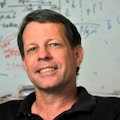Edward F. DeLong, Ph.D.
Professor, Department of Oceanography, University of Hawai’iVisiting Professor, Department of Civil and Environmental Engineering, Massachusetts Institute of TechnologyEdward F. DeLong’s website

SCOPE-ALOHA Project: Microbial Community Dynamics in Space and Time at Station ALOHA
Microbial community dynamics drive matter and energy flux in the ocean, but its spatial and temporal variability at different scales remains largely understudied. Although coarse larger scale vertical distributions of a number of biogeochemical processes are reasonably well constrained, their fine scale temporal variability and spatial patchiness is much less well understood. Furthermore, the importance of temporal sequencing and compartmentalization of interspecies biogeochemical processing and interactions, on the order of hours to days, remains virtually unexplored. Our interests therefore center on characterizing microbial community gene expression dynamics in natural habitats at relevant spatial and temporal scales, and their use as a proxy for microbial interactions and matter and energy cycling. Our specific near-term goals are to characterize these dynamics at a variety of nested spatial and temporal scales, and leverage these metrics to predict the tempos and modes of microbial ecological interactions and genomic evolution in both free-living and particle-attached microbial communities in the water column. We are also interested in exploring the variety of ways that marine heterotrophic microbes have acquired and utilize opsin-based photosystems to garner energy from photons in sunlit environments.
Bio:
Edward DeLong is a Professor of Oceanography at the University of Hawaii, and a Visiting Professor in the Department of Civil and Environmental Engineering at MIT. DeLong has spent most of his career developing molecular biological and genomic approaches to study naturally occurring microbial communities in the ocean. In the course developing these new approaches DeLong and collaborators have made fundamental discoveries about the nature and properties of microbial life in the sea. Discoveries include the recognition of two new types of abundant marine Archaea in coastal marine habitats, the identification of methane-consuming Archaea in anoxic marine sediments, and characterization of the first known light-driven ion pumps (proteorhodopsins) in marine bacteria. Currently DeLong is applying genomics and systems biology approaches to study microbial community dynamics in the sea, and elucidating the various ways that marine microbes garner energy from sunlight using opsin-based photosystems. DeLong is a Fellow in the American Academy of Arts and Science, the American Academy of Microbiology, the U. S. National Academy of Science, the American Association for the Advancement of Science, and the Eurpoean Molecular Biology Association. Honors include the Vladimir Ivanovich Vernadsky Medal of the European Geosciences Union, the Proctor and Gamble Award in Applied and Environmental Microbiology, the American Society for Microbiology D.C. White Research and Mentoring Award, and the U.C. Davis College of Biological Sciences Outstanding Alumni Award. DeLong has served as co-Director of C-MORE, and he will now serve as SCOPE co-Director with Dr. David Karl. Professor DeLong will serve as President of the International Society for Microbial Ecology from 2018-2020.